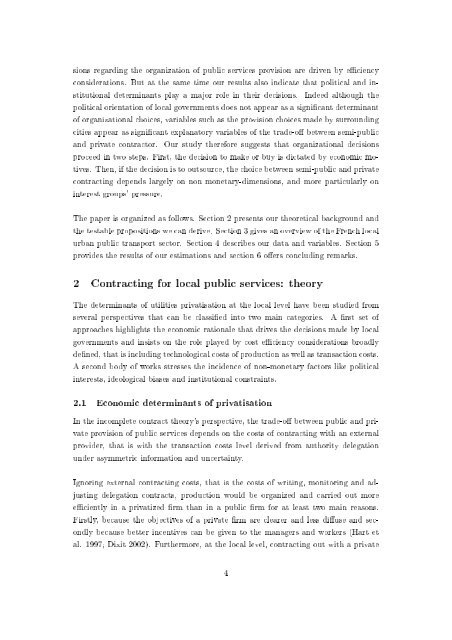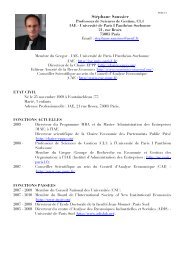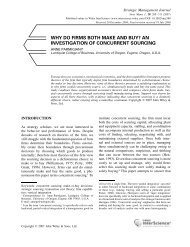Make or Buy Urban Public Transport Services: A Rational Choice?
Make or Buy Urban Public Transport Services: A Rational Choice?
Make or Buy Urban Public Transport Services: A Rational Choice?
You also want an ePaper? Increase the reach of your titles
YUMPU automatically turns print PDFs into web optimized ePapers that Google loves.
sions regarding the <strong>or</strong>ganization of public services provision are driven by eciency<br />
considerations. But at the same time our results also indicate that political and institutional<br />
determinants play a maj<strong>or</strong> role in their decisions. Indeed although the<br />
political <strong>or</strong>ientation of local governments does not appear as a signicant determinant<br />
of <strong>or</strong>ganizational choices, variables such as the provision choices made by surrounding<br />
cities appear as signicant explanat<strong>or</strong>y variables of the trade-o between semi-public<br />
and private contract<strong>or</strong>. Our study theref<strong>or</strong>e suggests that <strong>or</strong>ganizational decisions<br />
proceed in two steps. First, the decision to make <strong>or</strong> buy is dictated by economic motives.<br />
Then, if the decision is to outsource, the choice between semi-public and private<br />
contracting depends largely on non monetary-dimensions, and m<strong>or</strong>e particularly on<br />
interest groups' pressure.<br />
The paper is <strong>or</strong>ganized as follows. Section 2 presents our the<strong>or</strong>etical background and<br />
the testable propositions we can derive. Section 3 gives an overview of the French local<br />
urban public transp<strong>or</strong>t sect<strong>or</strong>. Section 4 describes our data and variables. Section 5<br />
provides the results of our estimations and section 6 oers concluding remarks.<br />
2 Contracting f<strong>or</strong> local public services: the<strong>or</strong>y<br />
The determinants of utilities privatisation at the local level have been studied from<br />
several perspectives that can be classied into two main categ<strong>or</strong>ies. A rst set of<br />
approaches highlights the economic rationale that drives the decisions made by local<br />
governments and insists on the role played by cost eciency considerations broadly<br />
dened, that is including technological costs of production as well as transaction costs.<br />
A second body of w<strong>or</strong>ks stresses the incidence of non-monetary fact<strong>or</strong>s like political<br />
interests, ideological biases and institutional constraints.<br />
2.1 Economic determinants of privatisation<br />
In the incomplete contract the<strong>or</strong>y's perspective, the trade-o between public and private<br />
provision of public services depends on the costs of contracting with an external<br />
provider, that is with the transaction costs level derived from auth<strong>or</strong>ity delegation<br />
under asymmetric inf<strong>or</strong>mation and uncertainty.<br />
Ign<strong>or</strong>ing external contracting costs, that is the costs of writing, monit<strong>or</strong>ing and adjusting<br />
delegation contracts, production would be <strong>or</strong>ganized and carried out m<strong>or</strong>e<br />
eciently in a privatized rm than in a public rm f<strong>or</strong> at least two main reasons.<br />
Firstly, because the objectives of a private rm are clearer and less diuse and secondly<br />
because better incentives can be given to the managers and w<strong>or</strong>kers (Hart et<br />
al. 1997; Dixit 2002). Furtherm<strong>or</strong>e, at the local level, contracting out with a private<br />
4





